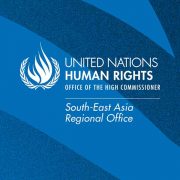NEWS RELEASE: UN Human Rights Office welcomes orderly communal vote in Cambodia, calls for re-opening civil society space
BANGKOK (7 June 2017) – The UN Human Rights Office for South-East Asia welcomed the orderly conduct of voting in the communal elections held across Cambodia on 4 June, and expressed hope that the smooth and peaceful poll bodes well for the democratic process ahead of next year’s general election.
“We are pleased to have witnessed that the violence, military intervention, and arrests that were threatened prior to the elections did not take place and that the people of Cambodia expressed general satisfaction with the process,” said Katia Chirizzi, the deputy regional representative of the South-East Asia Office in Bangkok.
The UN Human Rights Office observed the human rights environment of the vote, as it has every election since the establishment of its office there in 1993. It applauded the fact that in contrast with previous ballots no voters this time claimed that they had been kept from voting.
The Regional Office congratulated Cambodians who turned out in exceptionally high numbers, civil society organizations that also mobilized in large numbers to scrutinize the election, all the participating political parties, and the National Election Committee on its preparations.
However, reports were received prior to the vote of some opposition politicians being threatened and obstructed from campaigning, and some civil society election monitors being subjected to intimidation and harassment.
“Having done well with the organization of the vote, we are confident that the reformed National Election Committee will be able to deal with any election-related complaints that come to its attention in strict accordance with the law, including the internationally established human right to participate in public affairs,” said Chirizzi, stressing the importance of preventing a repeat of such intimidating behaviour ahead of the 2018 general election.
“The elections have set new benchmarks in transparency, while revealing some ways in which the process could be further strengthened next year. In particular, the politicized threats and arrests of civil society actors and members of opposition parties should cease, so that, in their respective capacities, they may continue to play their legitimate role in a democratic Cambodia, particularly ahead of next year’s election. The release of the ‘Adhoc 5’ and Tep Vanny would be a crucial test of that space.”
ENDS
 OHCHR
OHCHR